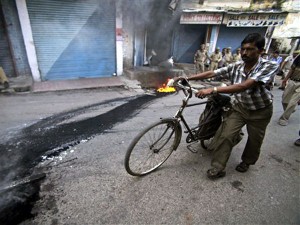Populist politics blamed for slow India reforms

An Indian man pushes his bicycle past burning tires set ablaze by India’s opposition Bharatiya Janata Party (BJP) activists at a closed market area during a nationwide strike in Jammu, India, Thursday, Sept. 20, 2012. Angry opposition supporters disrupted trains in India on Thursday but had only limited success in enforcing a national strike to protest a government decision to cut fuel subsidies and open the country’s huge retail market to foreign companies. AP/Channi Anand
NEW DELHI—A nationwide strike in India has highlighted the difficulties in pushing through reforms in an era of fractious coalition politics despite the clamor for decisive action from business leaders.
The opposition as well as the ruling Congress coalition’s biggest ally, the regional Trinamool Congress, have denounced the government’s plans for a blitz of market-opening measures as a crushing attack on the poor.
The firestorm marks the latest political battle faced by the government since it was elected in 2004, with even minor policy changes such as hiking fares on the country’s dilapidated rail system becoming major points of contention.
“India is a populous country with populist slogans – people fall for populist slogans. It is easy for politicians to say reforms are anti-poor,” political analyst Subhash Agrawal, head of think-tank India Focus, told AFP.
Singh used to be hailed as India’s “economic liberator” for igniting the fuse for faster growth by embracing freer markets when he was finance minister in 1991 and the economy was in the midst of crisis.
But his stint as prime minister has disappointed investors who had hoped for a second generation of liberalization steps – something largely absent until last week when his government announced a slew of changes.
Foreign direct investment is to be allowed in the retail, aviation and broadcasting sectors, privatizations will resume, and steps have been taken to cut deficit-bloating subsidies on diesel and gas.
Analysts say Singh and more importantly his boss, Congress’s pro-poor party president Sonia Gandhi, appeared to have been convinced such steps were necessary to improve the country’s bleak economic outlook, analysts say.
India’s deteriorating growth, ballooning fiscal deficit along with the threat of losing its investment grade status “all played a role in forcing the hand of authorities,” said Credit Suisse economist Robert Prior-Wandesforde.
“It’s a shame that the government waited so long to take action, but, as is often the case in India, it requires near crisis conditions before anything is done,” he said.
But Singh’s gamble could hasten elections, now due in 2014, as the powerful Trinamool party led by the mercurial Mamata Banerjee has said it will exit the ruling coalition, leaving the government in a minority.
“We have a sea of populist, totally opportunist parties,” B.G. Verghese of India’s Center for Policy Research, a policy think-tank, told AFP.
India has been subject to the vagaries of coalition politics and increasingly influential regional parties since 1996, with Congress losing its ability to win a majority in the parliament like it did in the 1980s.
Nearly a third of India’s 29 states now are run by regional parties while Congress and the main Hindu nationalist opposition Bharatiya Janata Party govern the rest of the fractured political landscape.
“Any political party which opposes subsidies, supports any kind of rational pricing on power or fuel, loses out on popularity – if not most importantly – on votes,” said independent economist T.C.A. Srinivasa Raghavan.
“This has not happened overnight, this is a monster that has been growing slowly with a generation of voters raised on expectations of government freebies,” said Raghavan, a former consultant to the Reserve Bank of India.
Others point out that coalition politics demands strong leadership and a clear vision that is well communicated and explained to voters – attributes missing in the Singh-Gandhi tandem, say critics.
Soft-spoken and media-shy Singh, who turns 80 next week, “unfortunately… can’t communicate in a language required for a janata darbar (people’s court),” said leading publisher Prabhu Chawla.
Furthermore, any Indian government must find a way of bridging the gap between the two-thirds of the population that live in mostly crushingly poor rural areas and an increasingly demanding middle class in cities.
The stakes are high for India as it grapples with how to bring in transformational change that will reduce its entrenched poverty and elevate it to a global power.
Singh himself has hinted at the potentially destabilizing effect of an under-performing economy, a concern shared by China’s Communist Party as it attempts to provide jobs for its billion-plus population.
“If we do not increase the pace of the country’s economic growth… it most certainly affects our national security,” Singh warned in August in a speech to mark 65 years of India’s independence from Britain.